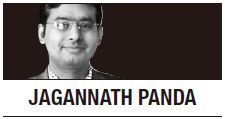
A clear foreign policy graph in Seoul is still evolving under the new President Moon Jae-in. Pointing toward a more engaging foreign policy, President Moon in his inaugural speech on May 10 argued Seoul’s policy ambition to restore peace in the Korean Peninsula, where the new administration might reach out to Washington, Beijing and Tokyo, including Pyongyang if required. This early policy depiction is certainly encouraging, given the foreign policy paralysis that Seoul has undergone in recent times under Park Geun-hye’s regime. Yet it needs to be seen whether Seoul’s foreign policy would still be Northeast Asia centric, focusing on powers that directly interest South Korea only. Where will India, supposedly a special strategic partner of the Republic of Korea, figure in Moon’s foreign policy?
It was only during the campaign trail Moon Jae-in talked about a “Northeast Asia plus foreign policy,” factoring India along with ASEAN as two important considerations in South Korea’s proposed new foreign policy along with the United States, China, Russia and Japan. After Moon’s victory, early signals from Seoul indicate that India factors highly in Seoul’s new foreign policy thinking. The elevation of Cho Hyun, the immediate former ambassador to India, as one of the six newly appointed vice-ministers, who will be in charge of foreign affairs and multilateral economic issues, is a clear sign that former India hands in Moon’s foreign policy team are getting strengthened. The recent visit of Chung Dongchea, a special envoy of President Moon Jae-in, to New Delhi explains that South Korea’s new foreign policy will factor India more seriously than before.
Leaderships in South Korea have repeatedly acknowledged India’s Look East or Act East policy and have tried to find convergence with it in South Korea’s foreign policy. However, a serious collaboration between the two countries has not really been scaled at regional level. Policy designs such as the Sunshine Policy, Global Korea Program, New Asia Initiative and Northeast Asia Peace Initiative (NAPCI) have been the main policy directives for South Korea over last two decades, but in none of these policy initiatives has India been factored exclusively in Seoul’s foreign policy.
India might be positioned as an important economic partner in Seoul’s new foreign policy under Moon Jae-in but may fall short in having a prominent place in Seoul’s regional diplomacy. A clue of this could probably be seen in a recent statement of Park Soo-hyun, the Presidential Spokesman of Moon Jae-in administration, where he said that “India, which has a massive domestic market and continues to achieve 7 percent growth, is South Korea’s necessary partner for cooperation.”
Why South Korea will see India more as an economic partner than a regional strategic partner is not difficult to understand. This is due to the challenge that Seoul faces in maintaining a balance between China and the US. Moon Jae-in would like to rebuild South Korea’s relations with China, the biggest economic and politically influential power in the region. Besides, he would like to strengthen the relationship with the United States under the Trump administration.
After victory, Moon Jae-in has talked about a “new South Korea” where the stress is on domestic economic recovery, appeasing China as a partner and dealing with North Korea through a more engaging approach. But the prime quest behind the urge to establish a “new South Korea” would be how to sustain the tag of a “middle power” identity for Seoul.
This would require both domestic economic recovery and smart diplomacy, where India could emerge as a partner, bilaterally and regionally. South Korea is a trading economy and establishing closer economic ties with India would be immensely beneficial to Seoul. Connecting with India regionally will enhance South Korea’s middle power identity.
Early indications from Seoul suggest that both India and ASEAN will emerge more prominently in President Moon’s foreign policy. But South Korea needs to find a regional context to expand its contacts with ASEAN and India within the realm of economics as well as regional security since both ASEAN and India are two key components of the Asia-Pacific architecture. Both ASEAN and India are linked with South Korea under the Regional Comprehensive Economic Partnership (RCEP), which is a key to the future of Asia-Pacific economic integration.
To engage with ASEAN and India would require smart diplomacy on the part of President Moon, which should be based on bilateral as well as regional mode of networks and contacts. India on its part must reach out to Seoul more intently to establish a special connection with the Moon administration. Leaderships in both Seoul and New Delhi need to note that more purposeful regional India-South Korea ties are a reciprocal process, not a one-sided undertaking. Besides, a serious regional cooperation between India and South Korea will only strengthen their bilateral ties.
----
By Jagannath Panda
Dr. Jagannath Panda is a research fellow and heads the East Asia Centre at the Institute for Defence Studies and Analyses in New Delhi. -- Ed.






![[Exclusive] Hyundai Mobis eyes closer ties with BYD](http://res.heraldm.com/phpwas/restmb_idxmake.php?idx=644&simg=/content/image/2024/11/25/20241125050044_0.jpg)
![[Herald Review] 'Gangnam B-Side' combines social realism with masterful suspense, performance](http://res.heraldm.com/phpwas/restmb_idxmake.php?idx=644&simg=/content/image/2024/11/25/20241125050072_0.jpg)
